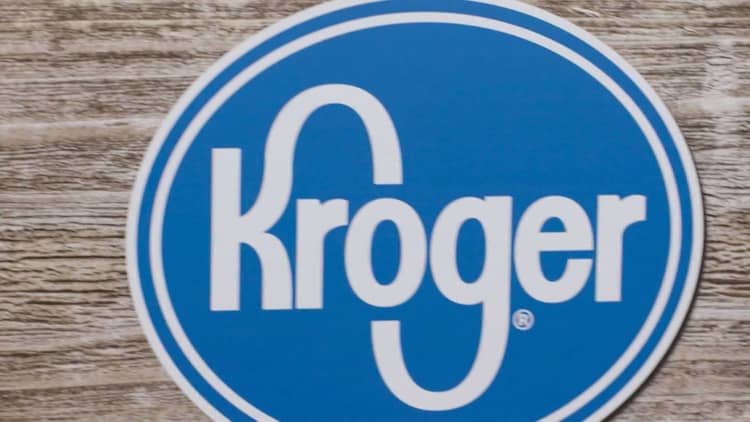
Kroger on Wednesday reaffirmed its forecast for 2017 amid a growing grocery price war with players such as Amazon-owned Whole Foods, Wal-Mart and low-price leaders Aldi and Lidl.
Kroger also announced it's exploring strategic alternatives, with the help of Goldman Sachs, for its convenience-store business, including a potential sale. Kroger operates more than 780 convenience stores across 18 states, which combined had sales of $4 billion last year.
"Considering the current premium multiples for convenience stores, we feel it is our obligation as a management team to undertake a review," Chief Financial Officer Mike Schlotman said in prepared remarks.
In addition to convenience stores and supermarket centers, Cincinnati, Ohio-based Kroger operates a slew of jewelry stores, retail health clinics and pharmacies.
Kroger shares jumped more than 6 percent on the news.
At its annual investor meeting being held in New York, Kroger laid out its "Restock" plan, which will consist of heavy capital investments — $9 billion over the next three years — coupled with cost savings in certain business segments.
Kroger said it expects to generate more than $4 billion of free cash flow over the next three years, nearly double what the chain has generated since 2014.
"We have the scale, the data, the physical assets and human connection to win," said CEO Rodney McMullen. "Restock Kroger builds on our strengths and strategically repositions Kroger to accelerate our customer-centered efforts in order to create shareholder value."
The main goals of this plan include improving the customer shopping experience both online and in stores, investing an incremental $500 million in Kroger's store associates for better pay and training, and expanding its "Scan, Bag, Go" pilot to 400 stores, from the current 20, in 2018.
Kroger's "Scan, Bag, Go" option allows customers to check out items with a handheld scanner as they're shopping a store's aisles.
Meantime, Kroger is making bigger bets on its private-label lines, like Simple Truth for organic and Private Selection for gourmet. Kroger's own portfolio of brands reached $20.5 billion in sales this year, up from $15 billion in 2011.
Retailers across the board are more aggressively growing their selections of private-label products. The exclusive lines, like Whole Foods' 365 and Target's Market Pantry, offer ways for companies to set themselves apart and accumulate higher-margin sales.
"We are gaining market share, but we've allowed others to gain share more than we would be happy with," McMullen told investors on Wednesday. "We need to move faster in digital."
Kroger's digital order service, ClickList, lets shoppers ring up purchases online before heading to a store, and the company said it's been working on perfecting the offering. Just last month, Kroger reported its digital sales climbed more than 120 percent for the second quarter, fueled by ClickList's growth.
For 2017, Kroger still expects adjusted earnings to fall within a range of $2 to $2.05 per share. Identical supermarket sales, excluding fuel, should still be up 0.5 to 1 percent, the company reaffirmed Wednesday.
Looking ahead, the grocery retailer said it anticipates earnings per share to be flat to "slightly-up" next year, without offering additional guidance. Though, Schlotman added that identical supermarket sales should be stronger next year.
Even with Wednesday's gains, Kroger has seen its stock fall more than 37 percent this year. The grocery chain has taken a beating ever since Amazon announced its plans in June to acquire Whole Foods.
Update: This story has been updated to reflect that Kroger's convenience store business, including fuel, generated $4 billion in total sales last year. Kroger had initially reported its convenience store business generated revenue of $1.4 billion, which only reflected inside sales, in 2016. Kroger shares were halted Wednesday afternoon, awaiting Kroger's press release with the update.


